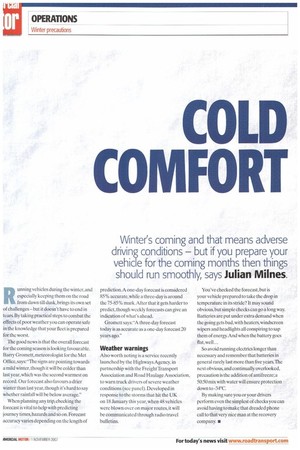COLD COMFORT
Page 56

If you've noticed an error in this article please click here to report it so we can fix it.
Winter's coming and that means adverse drivin conditions — but if you prepare your vehic e for the coming months then things should run smoothly, says Julian Milnes.
Running vehicles during the winter, and especially keeping them on the road from dawn till dusk, brings its own set of challenges — but it doesn't have to end in tears. By taking practical steps to combat the effects of poor weather you can operate safe in the knowledge that your fleet is prepared for the worst.
The good news is that the overall forecast for the coming season is looking favourable. Barry Gromett, meteorologist for the Met Office, says: 'The signs are pointing towards a mild winter, though it will be colder than last year, which was the second warmest on record. Our forecast also favours a drier winter than last year, though it's hard to say whether rainfall will be below average."
When planning any trip, checking the forecast is vital to help with predicting journey times,hazards and so on. Forecast accuracy varies depending on the length of prediction.A one-day forecast is considered 85% accurate,while a three-day is around the 75-85% mark. After that it gets harder to predict,though weekly forecasts can give an indication of what's ahead.
Gromett says: 'A three-day forecast today is as accurate as a one-day forecast 20 years ago."
Weather warnings Also worth noting is a service recently launched by the Highways Agency, in partnership with the Freight Transport Association and Road Haulage Association, to warn truck drivers of severe weather conditions (see panel). Developed in response to the storms that hit the UK on 18 January this year, when 48 vehicles were blown over on major routes, it will be communicated through radio travel bulletins. You've checked the forecast,but is your vehicle prepared to take the drop in temperature in its stride? It may sound obvious, but simple checks can go a long way. Batteries are put under extra demand when the going gets bad,with heaters, windscreen wipers and headlights all conspiring to sap them of energy. And when the battery goes flat, well...
So avoid running electrics longer than necessary and remember that batteries in general rarely last more than five years.The next obvious, and continually overlooked, precaution is the addition of antifreeze; a 50:50 mix with water will ensure protection down to -34°C.
By making sure you or your drivers perform even the simplest of checks you can avoid having to make that dreaded phone call to that very nice man at the recovery company..






















































































































































































